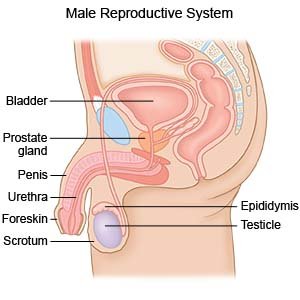Prostate Photovaporization
Medically reviewed by Drugs.com. Last updated on Aug 4, 2025.
Prostate photovaporization (PVP) is a procedure that uses a laser to vaporize (burn away) part of the prostate gland. This can help reduce urinary problems caused by an enlarged prostate.
 |
DISCHARGE INSTRUCTIONS:
Seek care immediately if:
- You cannot urinate, or if you have a catheter, no urine is filling the bag.
- Your catheter comes out of your urethra.
- You have lower abdominal or back pain that does not go away.
- You have redness, pain, blood, or drainage where the catheter enters your penis.
- Your urine is red, cloudy, and foul smelling.
Call your doctor if:
- You have a fever.
- You have chills, a cough, or feel weak and achy.
- Your symptoms get worse.
- You are dizzy, have nausea, or are vomiting.
- You have questions or concerns about your condition or care.
Related medications
Medicines:
You may need any of the following:
- NSAIDs , such as ibuprofen, help decrease swelling, pain, and fever. This medicine is available with or without a doctor's order. NSAIDs can cause stomach bleeding or kidney problems in certain people. If you take blood thinner medicine, always ask your healthcare provider if NSAIDs are safe for you. Always read the medicine label and follow directions.
- Antibiotics may help prevent a bacterial infection.
- Take your medicine as directed. Contact your healthcare provider if you think your medicine is not helping or if you have side effects. Tell your provider if you are allergic to any medicine. Keep a list of the medicines, vitamins, and herbs you take. Include the amounts, and when and why you take them. Bring the list or the pill bottles to follow-up visits. Carry your medicine list with you in case of an emergency.
Bladder care:
- Empty your bladder on a regular basis. Try to urinate every 3 hours while you are awake. Do not let your bladder become too full. Urinate as soon as you feel the need. Do not drink liquids before you go to bed. Urinate right before you go to bed.
- Follow instructions for catheterization. You may need to catheterize yourself if you cannot urinate on your own. Ask for more information on self-catheterization.
Self-care:
- Return to your usual activities as directed. You may be able to do your usual activities in 2 to 3 days. Avoid strenuous activity, such as heavy lifting, riding a bike, or running. Do not sit on mechanical equipment that vibrates, such as a lawnmower or tractor. These activities can cause you to have blood in your urine.
- Do not have sex for at least 2 weeks after your procedure. This will help your urinary system heal.
- Prevent constipation. Eat foods that are high in fiber, and drink more liquids. High-fiber foods, such as fruits, vegetables, and whole grains, will help soften your bowel movements. Regular exercise and extra liquids also help prevent constipation.
Follow up with your doctor as directed:
Write down your questions so you remember to ask them during your visits.
© Copyright Merative 2025 Information is for End User's use only and may not be sold, redistributed or otherwise used for commercial purposes.
The above information is an educational aid only. It is not intended as medical advice for individual conditions or treatments. Talk to your doctor, nurse or pharmacist before following any medical regimen to see if it is safe and effective for you.
Further information
Always consult your healthcare provider to ensure the information displayed on this page applies to your personal circumstances.
